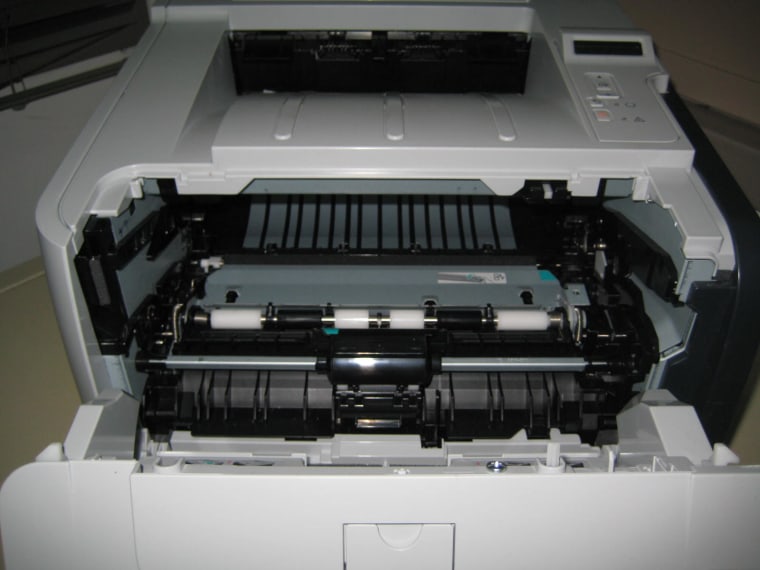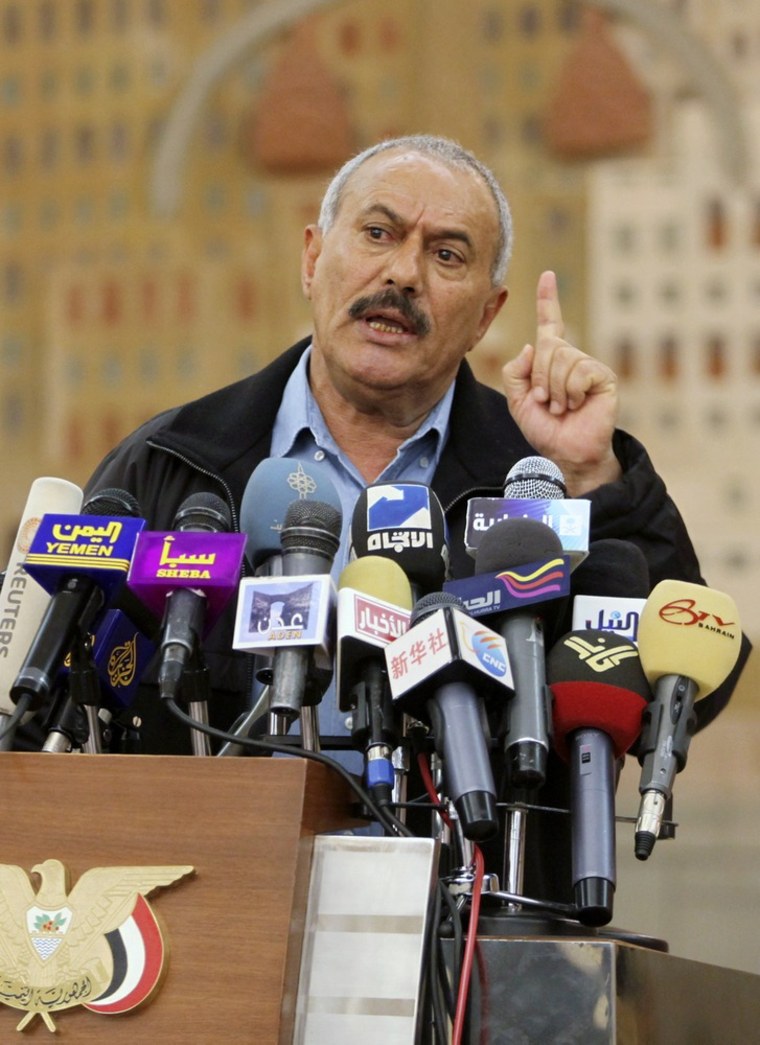Yemeni authorities on Saturday arrested a woman thought to be involved in sending explosive packages headed to the United States and were searching for more suspects in a terror plot believed linked to al-Qaida, Yemeni security officials said.
The arrest came after authorities surrounded a house where she was hiding in the capital San'a, Reuters reported.
The suspect is a medical student who was traced from a phone number on the shipping invoice, NBC News reported. Her father works as an oil engineer.
Yemeni officials told The Associated Press authorities were searching for a number of suspects believed to have used forged documents and ID cards that played a role in the plot that was thwarted Friday.
Several U.S. officials identified the terrorist group's top explosives expert in Yemen as the most likely bombmaker.
Yemeni President Ali Abdullah Saleh earlier told reporters that the United States and the United Arab Emirates provided him with information that identified the woman as a suspect. "Yemen is determined to continue fighting terrorism and al-Qaida in cooperation with its partners. But we do not want anyone to interfere in Yemeni affairs by hunting down al-Qaida," Saleh said at a news conference. He gave no details about the woman and did not take questions from journalists.
Yemeni authorities were checking more packages in a search for the terrorists who tried to mail bombs to Chicago-area synagogues in a brazen plot that officials said bore the hallmarks of al-Qaida.
The package bombs have prompted investigators in the U.S. and the United Arab Emirates to re-examine the crash of a UPS cargo plane in Dubai on Sept. 3, NBC News reported.
Some reports at the time said a fire had broken out in the plane just after it took off from Dubai International Airport. The crash killed two crew members.
"People are obviously taking another hard look at why that plane went down, but no hard conclusions have been reached yet," a U.S. official told NBC News.
Authorities on three continents thwarted the mail-bomb attacks when they seized explosives on cargo planes in Dubai and England on Friday. The plot sent tremors throughout the U.S., where after a frenzied day searching planes and parcel trucks for other explosives, officials temporarily banned all new cargo from Yemen.

It still wasn't clear whether the bombs, which officials said were wired to cell phones, timers and power supplies, could have been detonated remotely while the planes were in the air, or when the packages were halfway around the world in the U.S.
The packages were addressed to two Jewish institutions in the Chicago area. But British Prime Minister David Cameron said Saturday that he believes the explosive device found at the East Midlands Airport in central England was intended to detonate aboard the plane.
British Home Secretary Theresa May added that the bomb was powerful enough to take down the plane.
"I can confirm the device was viable and could have exploded. The target may have been an aircraft and had it detonated, the aircraft could have been brought down," May said.
A U.S. official said authorities believe a second device found in Dubai was similarly potent.
Al-Qaida's Yemen branch, known as al-Qaida in the Arabian Peninsula, took credit for a failed bombing aboard a Detroit-bound airliner last Christmas. The bomb used in that attack contained PETN, an industrial explosive that was also used in the mail bombs found Friday.
The suspected bombmaker behind the Christmas Day attack, Ibrahim Hassan al-Asiri, is also the prime suspect in the mail bomb plot, several U.S. officials said. Al-Asiri also helped make another PETN device for a failed suicide attempt against a top Saudi counterterrorism official last year. The official survived, but his attacker died in the blast.
"The forensic analysis is under way," Obama's counterterror chief John Brennan said Friday. "Clearly from the initial observation, the initial analysis that was done, the materials that were found in the device that was uncovered was intended to do harm."
Officials said the plot was discovered thanks to intelligence passed from Saudi Arabia. Without that tip, it's unclear whether anyone would have discovered the bombs before they were airborne — or on U.S. soil.
Currently, American officials do not get details about the contents of a U.S.-bound cargo plane until four hours before it's scheduled to land. In the case of long distance flights, those planes would already be airborne. Once a plane lands, officials screen packages that they feel warrant a closer look.
The failed attack should be a "wake up call" that the U.S. needs to step up security on cargo planes, the top Republican on the Senate Intelligence Committee, Kit Bond, said.
U.S. officials were still cobbling together details about the packages but one official briefed on the investigation said authorities believed the plotters may have been associated with two institutions called "Yemen American Institute (for) Languages-Computer-Management" or the "American Center for Training and Development."
It was not immediately clear whether those institutions even exist or whether that information came from false documents or fake addresses.
The U.S. temporarily banned all incoming cargo and mail from Yemen. The U.S. Postal Service says it's temporarily stopped accepting inbound international mail that's originating in Yemen. A UPS employee in Yemen said the office has temporarily halted receiving any packages for delivery.
In Chicago, the leader of a North Side synagogue told members of his congregation at weekend services that a smaller congregation that uses their building was one of the targets of the plot.
Rabbi Michael Zedek of Emmanuel Congregation said he was told by a Jewish leader in Chicago that the smaller Or Chadash congregation was one of the targets. The FBI did not confirm that, and both Zedek and Chadash Rabbi Larry Edwards said they had not spoken to law enforcement.
Or Chadash members took the news calmly, Edwards said. The synagogue, which has about 100 members, serves lesbian, gay, bisexual and transgendered Jews and their families.
The White House said Brennan called Yemen's president and made clear that the U.S. is ready to help the Yemeni government in the fight against al-Qaida. The U.S. already assists Yemen with airstrikes and other counterterrorism support.
Yemen's al-Qaida branch is the most active of the terrorist group's affiliates and has increasingly become the face of its recruitment efforts in the West. The country is home to radical U.S.-born cleric Anwar al-Awlaki. He has been linked in the Christmas attack and has inspired other terrorists with his violent message.
Also hiding in Yemen is Samir Khan, an American who declared himself a traitor and helps produce al-Qaida propaganda.
The Homeland Security Department said it was stepping up airline security, but White House spokesman Robert Gibbs said Americans did not need to change their travel plans.
